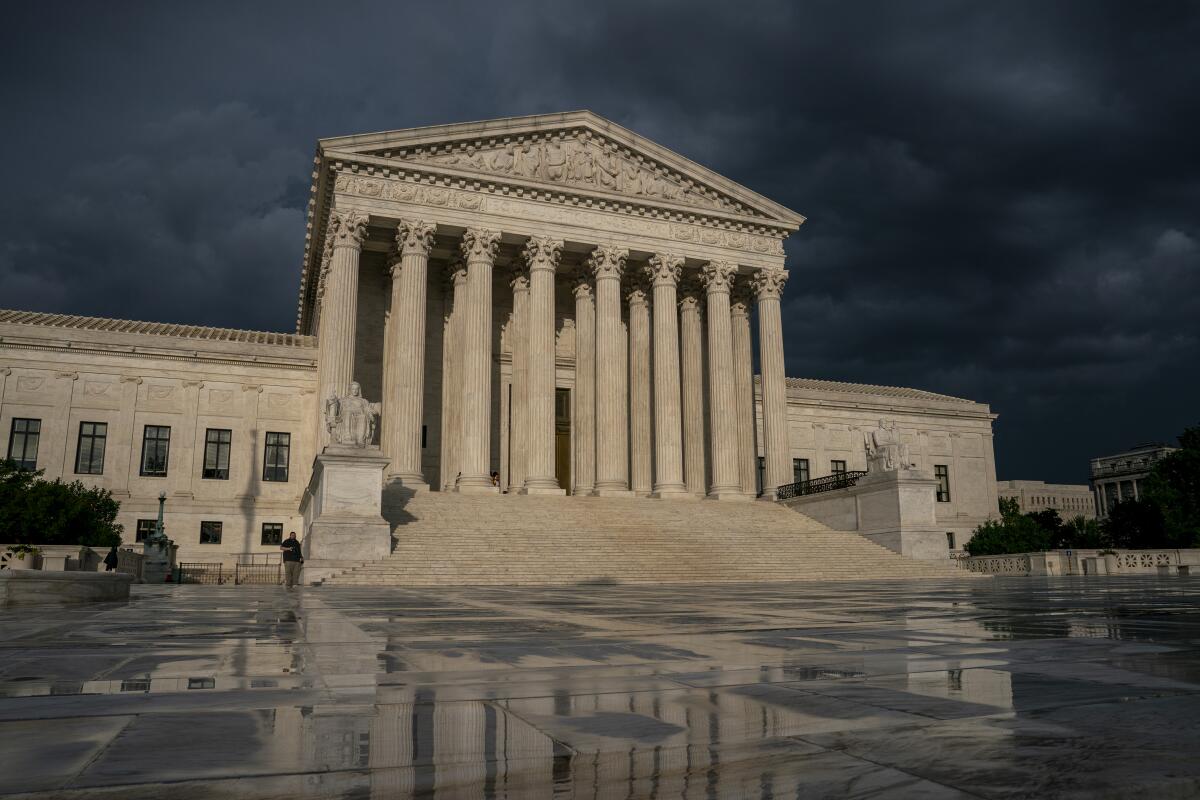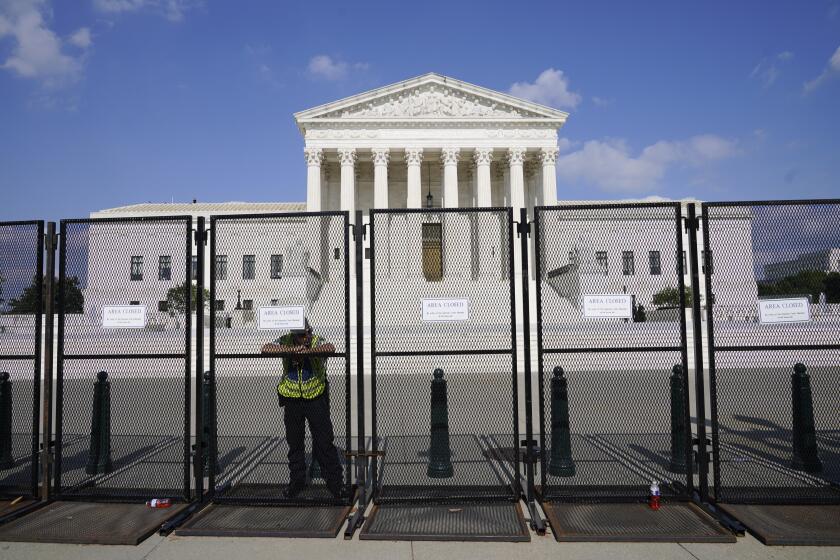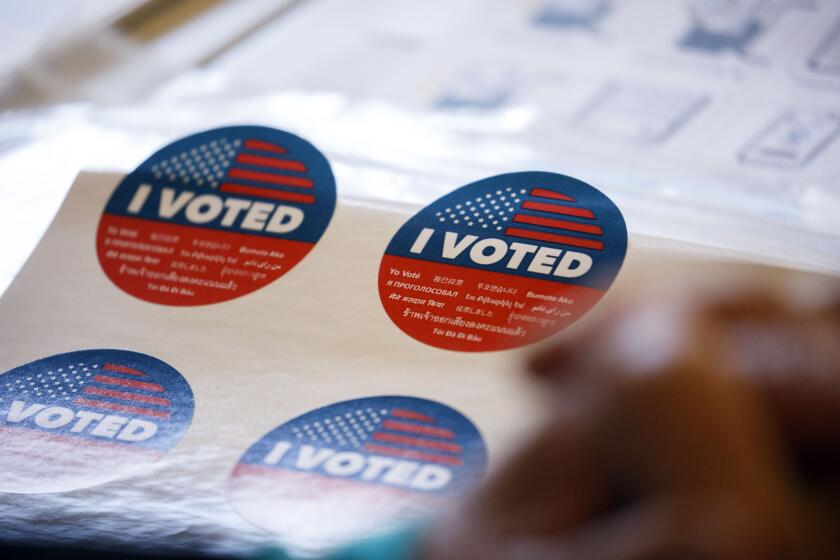The ominous way the Supreme Court could change our elections

- Share via
Does a state supreme court have the power to find that an act of the state legislature violates the state constitution? The answer to that question should be clear and obvious, but the conservative justices of the Supreme Court expressed doubt about it at oral arguments in Moore vs. Harper on Wednesday. It is not hyperbole to say that the future of American democracy may turn on the court’s answer.
The case concerns the so-called “independent state legislature” theory, which posits that the legislature of a state gets the final word on how elections to Congress are conducted and state courts are powerless to do anything even if the legislature is violating the law. It is a theory of recent vintage, never having been accepted in American history. If adopted by the Supreme Court, its implications are ominous.
Moore vs. Harper arises from partisan gerrymandering for congressional districts in North Carolina. North Carolina is almost evenly divided between Democrats and Republicans. In 2020, Donald Trump beat Joe Biden in the state, but only by 1.35 percentage points. North Carolina has a Democratic governor and attorney general, but a Republican-controlled state legislature.
If the court’s conservatives adopt the independent state legislature theory, they would be making up law to create an outcome of one-party rule.
After the 2020 census, North Carolina, like all states, redrew election districts. The Republican-controlled Legislature drew the districts so that Republicans would be very likely to win 10 of 14 congressional seats. The North Carolina Supreme Court found that this gerrymandering violated the state’s constitution and appointed a commission to redraw the districts in a nonpartisan way. In the recent midterms, Democrats and Republicans each won seven congressional seats, as would be expected in a state that is almost exactly evenly split between the parties.
But the North Carolina Legislature and its supporters went to the U.S. Supreme Court and contend that the state’s Supreme Court has no legal authority to be involved, even to enforce the state constitution, because the state Legislature gets the final, unreviewable word. They base this argument on a provision of Article I, section 4 of the Constitution which says that the legislature of each state shall determine the time, place and manner for choosing its members in Congress.
There are many problems with this theory. It always has been understood that courts can review all legislative actions to ensure their compliance with the law. Article I of the Constitution grants Congress many powers, but the courts get to decide whether an act of Congress violates the Constitution. In fact, at the oral argument, Justice Amy Coney Barrett, a conservative, expressed the view that the state courts have the powers granted to it by the state constitution.
If the Supreme Court were to accept the independent state legislature theory, then no court could invalidate partisan gerrymandering, however extreme. It also would mean that states, like California, no longer could have independent commissions to draw election districts for congressional seats. The Court upheld these commissions in 2015 in Arizona State Legislature vs. Arizona Independent Redistricting Commission and rejected the independent state legislature theory. But the majority in that 5-4 decision included Justices Anthony M. Kennedy and Ruth Bader Ginsburg, who are no longer on the bench.
The “independent state legislature theory” would leave state courts, constitutions and others powerless to stop voter suppression.
Although the independent state legislature theory is at odds with basic principles of American government, at the oral argument the most conservative justices — Clarence Thomas, Samuel Alito and Neil Gorsuch — expressed support for it. In his questions, Justice Alito, for example, left no doubt that he buys the independent state legislature theory and that it limits state courts from enforcing state laws when it comes to congressional elections.
It was unclear from the arguments as to whether Chief Justice John Roberts and Justice Brett Kavanaugh are likely to join them. They suggested looking for a compromise where the state court could invalidate districting, but then do no more than send the matter back to the legislature to draw new districts. That seems a recipe for an endless stalemate.
The potential implications of the Supreme Court’s accepting the independent state legislature theory extend beyond congressional elections. There is another provision of the Constitution, Article II, section 1, which says that the legislature of the state shall allocate that state’s electors for the electoral college. In fact, the independent state legislature theory was first advanced by Chief Justice William Rehnquist in a concurring opinion in Bush vs. Gore in 2000, where he said that the legislature of the state alone gets to allocate the electors from a state. Although Moore vs. Harper does not involve this provision or a presidential election, if the Supreme Court accepts the independent state legislature theory, it could mean that a state legislature could ignore the popular vote in a state and award the electors however it wanted, even when there is a state law awarding the electors to the winner of the popular vote.
In 2020, President Trump urged states with Republican legislatures, like Michigan and Wisconsin and Georgia, to award him their electoral votes, notwithstanding President Biden having won the popular vote in those states. None thankfully did so, but if the Supreme Court accepts the independent state legislature theory in Moore vs. Harper, it would be able to empower states to do exactly this in 2024, which could decide the presidential election.
This should be an easy case for the Supreme Court. Never before has it, or any court, accepted the independent state legislature theory. It is inconsistent with the inherent power of courts to review the constitutionality of legislative acts. It would allow state legislatures to violate state and perhaps federal laws with impunity. Yet, Wednesday’s oral arguments should leave us all afraid that there well might be a majority on the court that would accept this radical view, putting the country’s democracy in danger.
Erwin Chemerinsky is a contributing writer to Opinion and dean of the UC Berkeley School of Law. His latest book is “Worse Than Nothing: The Dangerous Fallacy of Originalism.”
More to Read
A cure for the common opinion
Get thought-provoking perspectives with our weekly newsletter.
You may occasionally receive promotional content from the Los Angeles Times.











